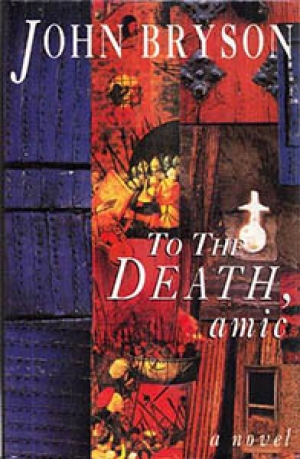John Bryson
John Bryson reviews 'Fate of a Free People: A radical re-examination of the Tasmanian wars' by Henry Reynolds
Making the sea passage south to Flinders Island, I began reading this while off-watch, hoping book and destination might augment, but tough weather cancelled free time until after a landfall sleep. I’ve not much enjoyed histories which cast these manuka and granite islands in dismal role, they are shockingly beautiful, but the crowded cemetery wails, the old lath church is empty of joyful song, and the rule of Commandant Jeanneret recalls similar miseries of bonded Malay and Bantamese on Cocos.
... (read more)In Richard Beasley’s third novel, a friendship between three boys ends violently, and one of them is tragically implicated. The lives of the young teenagers – Jake, Robbie, and Rory – are filled out with street football, driveway cricket, billycarts, fishing trips, slingshot target practice, and the comedy of flatulence. Their world is Rose Avenue during the Adelaide summer of 1977.
... (read more)A visitation of Kindly Death is recorded by the Law List in a glass cabinet beside the sandstone doorway of Court Four in the City Courthouse, the sole item for the day’s business, and for many days:
Trial: R v Ali Bashir. (1) Murder (2) Assist Suicide.
The second count, rather than the first, is the reason f ...
John Bryson reviews 'From Moree to Mabo: The Mary Gaudron Story' by Pamela Burton
Australia’s feisty first female High Court judge
John Bryson
From Moree to Mabo: The Mary Gaudron Story
by Pamela Burton
UWA Publishing, $49.95 pb, 511 pp, 9781742580982
H.V. Evatt, on the hustings during an election campaign, was asked by an eig ...
Judith Armstrong reviews 'To the death, Amic' by John Bryson
The trial of Lindy Chamberlain drew the fascinated attention of most Australians when it was reported day and night in every media outlet. It moved into a different but equally popular mode with the publication of John Bryson’s documentary novel Evil Angels and the screening of Fred Schepisi’s film of the same name. The novel not only won a clutch of awards but was translated into nine languages, a sufficient achievement to earn its author an enduring international reputation and to globalise what might otherwise have been a short-lived local curiosity. Bryson’s account picked up the dramatic intensity of the Central Australian setting and the human agonies of the players, as well as the universal issues, such as justice and prejudice, that towered over the Rock and the courtroom.
... (read more)Ric Sissons reviews 'Backstage at the Revolution' by John Bryson
‘Dissatisfied’ summarises in a single word how I felt after reading Backstage at the Revolution. Dissatisfied not by John Bryson’s undoubtedly eloquent prose but by the publishing and marketing concept of the book.
... (read more)Spiro Zavos reviews 'Evil Angels: The death of Azaria Chamberlain in the central Australian desert, and the events leading to judgement' by John Bryson
John Bryson has tried to solve one of Australia’s great mysteries – how Azaria Chamberlain died. The cover of Evil Angels gives the clue to his answer. A bruise-coloured sky glowers over a stark, orange-brown desert. There is the twisted relic of a tree in the foreground and in front of it, like a spreading puddle of blood, the shadow of a dingo, its eyes on an evil slant.
... (read more)




